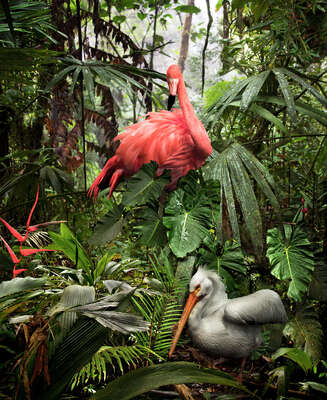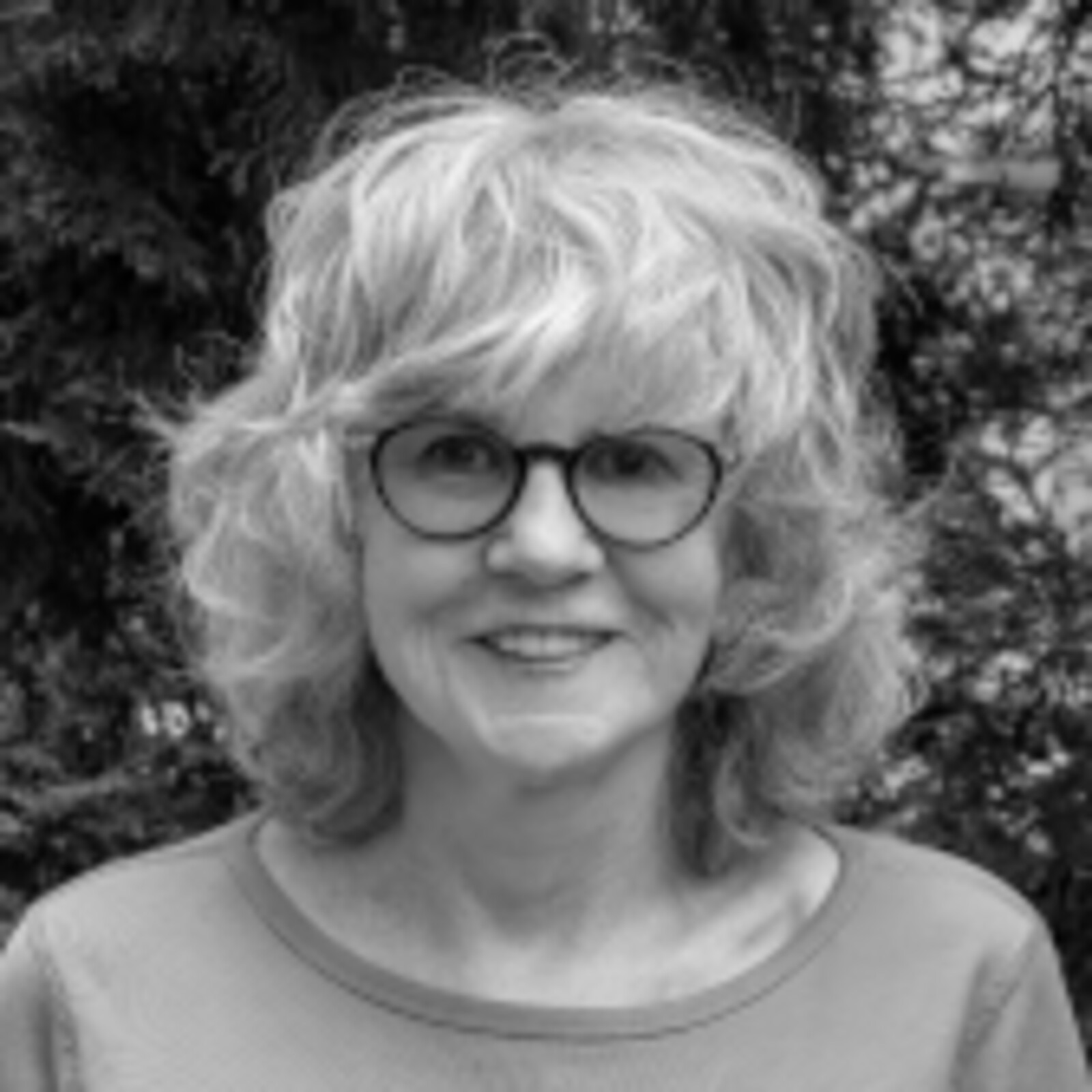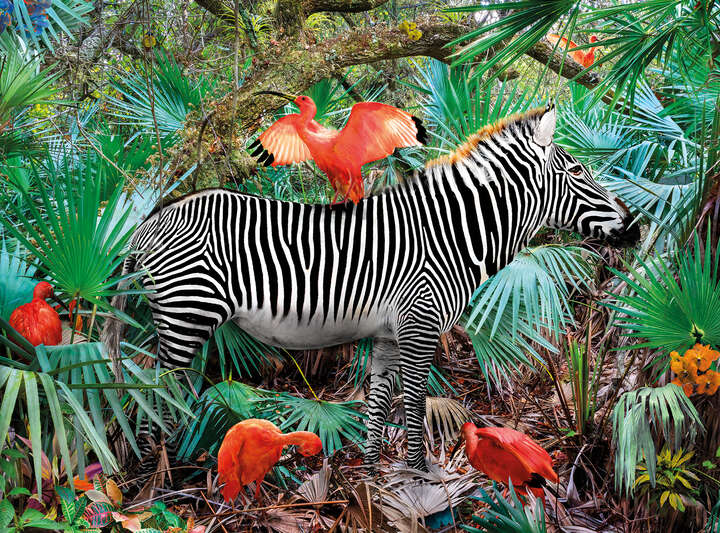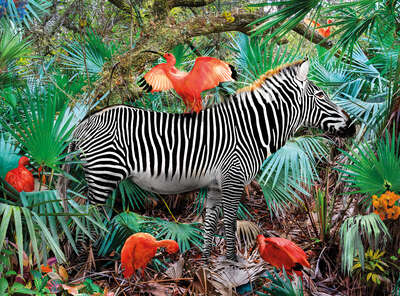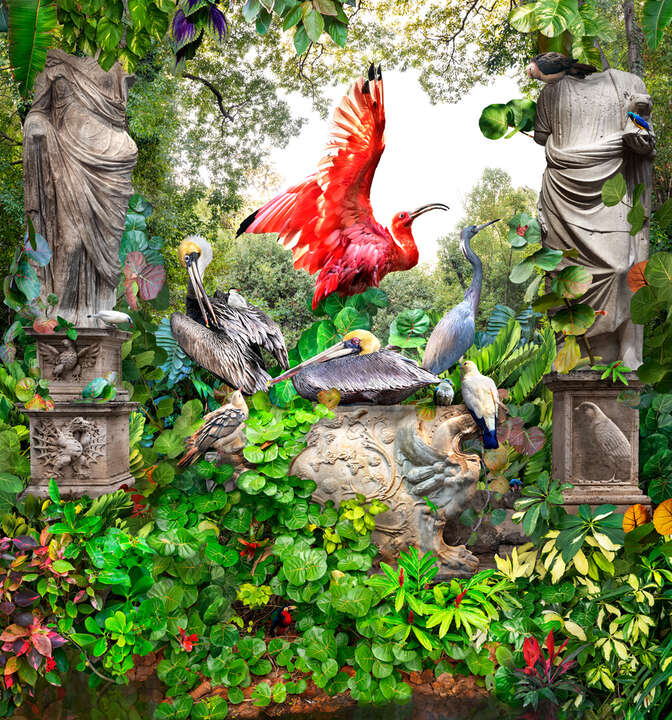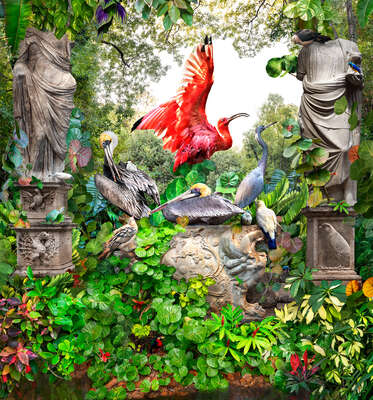Introduction
A flamingo and a pelican get lost in the jungle, or cranes explore new terrain. While it sounds like the beginning of a fairy-tale, it actually describes photographs so extraordinary, we have to ask ourselves: “Is this real?” New York photographer Pat Swain is a pioneer in digital art. She has developed her very own form of artistic expression.
Her curiously unique body of work lifts these creatures out of their natural habitats and places them in captivating environments – places where they ordinarily do not exist. These graceful birds take on sculptural dimensions, blending into the diverse flora perfectly on an aesthetic level. The spectacular contrast of colors is central to the power of the images, while the texture of the feathers echoes that of the vegetation.
But how do these birds end up in new territories? Places in which they have never existed? Here, the representational character of photography is challenged on a second level. Not only does Swain create the environments, the birds themselves are digitally transplanted; after photographing zoo animals, she composites them into these magnificent landscapes, where such birds would never have been found. Exploring the relationship between existence and environment, she draws our attention to the conservation of biodiversity and natural habitats.
It has come to this
Nature is fascinating in Pat Swain’s new series, not simply for its beauty and diversity, but also its resilience. Exotic plants and flowers embark on an unusual conquest: they’re reclaiming the habitats that once belonged to them and establishing harmony with the surrounding architecture. Lush flora meets classic, elegant forms. Swain even places charming birds mise-en-scène, who pose as the villa’s new inhabitants. They’re mirrored by yet another bird, the flamingos, who are painted upon the walls. With this composition Swain suggests that the arts will always look up to nature. A deep appreciation for nature is characteristic of Swain’s work. This time the artist takes the transitoriness of our civilization and confronts it with the eternal power of nature.
Bio
Pat Swain is an award-winning photographer. She holds a Master of Fine Arts from Pratt Institute and a M.A from Columbia University. Her photographs have been published in numerous publications. Among Swain’s many awards are The London Creative Award ‘Discovery of the Year’, International Photo Awards, finalist, ‘Talent of the Year’, Paris PX3 Photo Awards, First Place. Her photographs are in a number of collections including Goulandris Museum, Kissfad, Athens, Greece, Los Angeles Museum of Digital Art, Koc Foundation, Istanbul, Turkey, Petrified Forest National Park, Arizona, USA. She has taught Digital Imaging at School of Visual Arts in New York and various other universities. She currently lives and works in New York City.
Awards
| 2020 | International Photo Awards - Honorable Mention/Fine Art-Other, The 2020 Photo Review 36th Annual
15th Edition of Julia Cameron Award - Honorable Mention/Nature |
| 2019 | 14th Edition of Julia Cameron Award: Winner Still Life Category
New York Center for Photography: Grand Prize
Shoot The Frame: Wildlife Finalist |
| 2017 | 10th Pollux Award: Honorable Mention Fine Art
Julia Cameron 10th Edition: Winner Fine Art |
| 2016 | Art for Apes, Second Prize
Paris PX3 Award: Gold, Fine Art |
| 2015 | Julia Cameron Awards 7th Edition Finalist, Fine Art, |
| 2014 | The Center for Fine Art Photography: Juror’s Choice Center Forward Award |
| 2013 | Paris PX3 Photo Awards: First Place
Professional Women Photographers: Honorable Mention |
| 2012 | London International Creative Awards: Talent of the Year
The Worldwide Photography Gala Awards: Fine Arts: Runner-Up: 2
Loupe Awards: Silver award for Lost Flamingos in the Cloud Forest
ArtSlant: 3rd, 4th, 6th
Third Edition of The Julia Cameron Awards: Finalist
Professional Women Photographers: Second Prize |
| 2011 | Dave Bown Project Award
World Photography Awards: Pollux Award April: 2nd Prize
The Julia Margaret Cameron Awards, Second Edition: Third Place |
| 2010 | The International Aperture Awards: Silver and Bronze Award
International Photo Awards: Finalist for the Lucie Award
Los Angeles Center For Digital Art "DigitalArt.LA" Winner
PX3 Paris de la Photographie: First Place
The Jacob Riis Portfolio Awards: Portfolio finalist | |
| 2009 | The International Aperture Awards: Silver and Bronze Award
Photo District News Faces Contest: Winner Pet Division
| |
Collections
The Hopiteaux Universities a Genève, Geneva, Switzerland
Koc Foundation, Istanbul, Turkey
The Center of Fine Art Photography, Fort Collins, USA
The Gumusluk Academy, Bodrum, Turkey
Los Angeles Museum of Digital Art, LA, USA
Petrified Forest National Park, Arizona, USA
Pratt Institute, Brooklyn, NY, USA
World Photography Organization, USA
Exhibitions
Solo Exhibitions
| 2018 | Wild Bird Fund, New York, USA |
| 2011 | The Chickens of Cappadocia, Los Angeles Center for Digital Art Los Angeles, USA |
| 2010 | The Chickens of Cappadocia, C.A.M. Gallery, Istanbul, Turkey
|
Group Exhibitions
| 2020 | The 2020 Photo Review 36th Annual online Ausstellung
Fusion Art, online Ausstellung
FotoNostrum Gallery, Barcelona, Spain |
| 2019 | Jadite Gallery, New York, USA
Wild Bird Fund, New York, USA |
| 2018 | New York Center of Photography, online Ausstellung |
| 2017 | Limner Gallery, Hudson, New York, USA |
| 2016 | Art For Apes, Wynwood, Miami, USA
Center of Fine Art Photography, Fort Collins, USA
Hazan Projects, New York, USA
Rolando Chang Barrero Fine Art, Lake Worth, USA |
| 2015 | The Fence: Photoville: Boston, Brooklyn, Atlanta, Houston, USA
Talon Gallery, AZ in Conjunction with Petrified Forest Artist Residency, Show Low, USA
Goulandris Museum in Kissifad, Athen, Greece |
| 2014 | Heritage Museum of Malaga, Spain
The Photo Review: Online Ausstellung
The Center for Fine Art Photography, New York, USA |
| 2013 | Sofia Photo Salon, Lost Flamingo in the Cloud Forest, Sofia, Bulgaria
Photo Place Gallery, Middlebury, USA |
| 2012 | Garrison Art Center, Garrison, New York, USA
NO Gallery, New York, USA
Photo Place Gallery, Middlebury, USA
Borges Cultural Center, Buenos Aires, Argentina
Palais de Glace / Buenos Aires, Argentina |
| 2011 | Los Angeles Center for Digital Art, Los Angeles, USA
The Kiernan Gallery, Lexington, USA
Julia Cameron Awards, Palais de Glace, Buenos Aires, Argentina |
| 2010 | Los Angeles Center for Digital Art, Los Angeles, USA
PX3 Exhibition, Espace DUPON, Paris, France
|
Interview
Where do you find your art?
I am attracted to extremes mostly involving the sublime, quirky or beautiful. Animals and birds inspire me because I love them. Landscapes are profoundly inspirational and connect me to a larger sense of being. Nature is my spirituality. I really don’t know how I come up with the ideas; they have a life of their own. However, I do have a gift for associating and combining seemingly disassociated concepts. This creates interesting situations. There is an excitement when I have found something.
From an idea to its materialization: How do you approach your work?
Something or an idea inspires me to move forward with creating a picture. Often it is some sort of background or landscape. I then photograph all the elements I think I need for the image, i.e., foliage, animals, etc. I composite and compose these in Photoshop. Because what I am looking for in the image is not quite developed, I work through the picture until I have ‘found’ it, until it speaks to me. If I need more or different components while creating the picture, I will photograph them. It is a part planned, part intuitive process. And finally, when I hit it, I then work very hard to completion. A picture can take two months more or less to do…sometimes longer.
What is your favorite book?
I have many favorite books but an all-time favorite is a photography book by Brassai, ‘Paris at Night’. I never tire looking at his stunning black and white photographs of the underworld and nightlife of Paris in the 1930s.
Which artist would you like to have coffee with and what would you discuss?
Picasso is my favorite artist. (I have a photograph of Picasso by David Seymour in my studio, took a course just on Picasso in college and have read many books about him.) Picasso and I would discuss his use of photography in his art, his favorite times in life, favored works and why. Also, why he felt so compelled to destroy the women he was involved with especially when they left him. But he probably wouldn’t want to talk about that-he’d leave the café where we were having our café au lait! I’d save the conversation towards the end.
How did you get into art?
I got into photography accidentally. I took an art course in high school and discovered that I could not draw. After a few weeks, I transferred to photography and found it magical. I have done it ever since.
Who are the people in your surroundings that influence you?
No one really in my surroundings influences me. Mostly my inspiration and thus influence comes from looking at paintings.
Imagine you have a time machine. Where would you go?
If I could travel anywhere in time, it would be Paris in the 1920s and 1930s. Many of my favorite artists are from that era. (Perhaps I would have met Picasso, gotten romantically involved and then regretted it for the rest of my life!)
Other than art, what are you most passionate about?
Other than art, I am most passionate about animals, the environment, nature. Can you tell from my pictures? And, I have a deep interest in certain aspects of between the wars and World War II.
What are you working on right now?
Besides always working on images involving nature, etc. I am in between and searching for something new. As Picasso said, “you don’t make art, you find it.” I am searching to discover some exhilaratingly ‘find’. I hope…soon.
